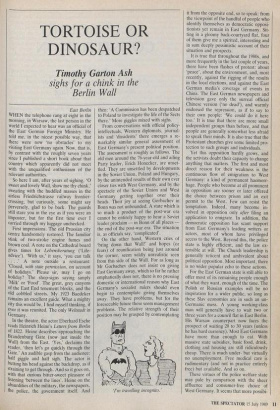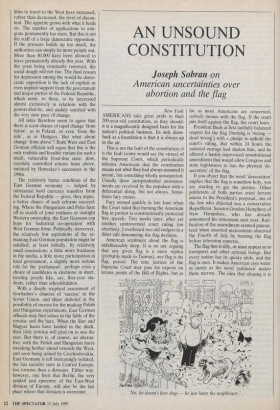TORTOISE OR DINOSAUR?
Timothy Garton Ash sighs for a chink in the
Berlin Wall East Berlin WHEN the telephone rang at eight in the morning, in Warsaw, the last person in the world .I expected to hear was an official of the East German Foreign Ministry. He told me, in the nicest possible way, that there were now `no obstacles' to my visiting East Germany again. Now, that is, by contrast with the roughly seven years since I published a short book about that Country which apparently did not meet with the unqualified enthusiasm of the relevant authorities.
So here I am, after years of sighing, '0 sweet and lovely Wall, show me thy chink,' sweating with the huddled masses in the airless Friedrichstrasse railway frontier- crossing, but curiously, some might say perversely, glad to be back. The guards still stare you in the eye as if you were an imposter, but for the first time ever I carried through my luggage unchecked.
First impressions. The old Prussian city centre handsomely restored. The familiar stink of two-stroke engine fumes and brown coal. A note on the Cathedral board gives times for Lebensberatung (`Life- advice). `With us,' it says, `you can talk • . ; A note outside a restaurant: `Closed, with state permission, on account of holidays.' Please sir, may I go on holiday? The shop-signs saying simply `Milk' or `Food'. The great, grey canyons of the East End tenement blocks, and the old cobbled streets. My 1923 Baedeker remains an excellent guide. What a mighty city this would be, I find myself thinking, if ever it was reunited. The only Weltstadt in Germany.
In the theatre, the actor Eberhard Esche reads Heinrich Heine's Letters from Berlin of 1822. Heine describes approaching the Brandenburg Gate (now just inside the Wall) from the East. `Yes,' declaims the reader, `then let's go quickly through the Gate.' An audible gasp from the audience: half giggle and half sigh. The actor is butting his head against the backdrop, as if straining to get through. And so it goes on, with that curious bitter-sweet pleasure of listening `between the lines'. Heine on the absurdities of the military, the newspapers, the police, the government itself. And
then: `A Commission has been despatched to Poland to investigate the life of the Sects there.' More giggles mixed with sighs. From conversations with official policy- intellectuals, Western diplomats, journal- ists and `dissidents' there emerges a re- niarkably similar general assessment of East Germany's present political position. The assessment is roughly as follows. The old men around the 76-year-old and ailing Party leader, Erich Honecker, are unset- tled. They are unsettled by developments in the Soviet Union, Poland and Hungary, by the unintended results of their own ever closer ties with West Germany, and by the spectacle of the Soviet Union and West Germany getting together over their heads. Their joy at seeing Gorbachev in Bonn was not unbounded. A state which is so much a product of the post-war era cannot be entirely happy to hear a Soviet leader proclaim — in Bonn of all places the end of the post-war era. The situation is, as officials say, `complicated'. On the other hand, Western cries of `bring down that Wall!' and hopes (or fears) of reunification being just around the corner, seem wildly unrealistic seen from this side of the Wall. For as long as Mr Gorbachev does not insist on giving East Germany away, which so far he rather emphatically does not, there is no pressing domestic or international reason why East Germany's socialist rulers should even begin to contemplate giving themselves away. They have problems, but for the foreseeable future these seem management problems. The relative strength of their position may be grasped by contemplating 'I'm travelling incognito.' it from the opposite end, so to speak: from the viewpoint of the handful of people who identify themselves as democratic opposi- tionists yet remain in East Germany. Sit- ting in a gloomy back-courtyard flat, four of them give me a spirited, interesting and in sum deeply pessimistic account of their situation and prospects.
It is true that throughout the 1980s, and more frequently in the last couple of years, there have been flashes of protest: about 'peace', about the environment, and, most recently, against the rigging of the results in the local elections, and against the East German media's coverage of events in China. The East German newspapers and television gave only the surreal official Chinese version (`no dead'), and warmly endorsed the repression, as if to say to their own people: `We could do it here too.' It is true that there are more small independent groups than before, and that people are generally somewhat less afraid to speak their minds. It is also true that the Protestant churches give some limited pro- tection to such groups and individuals.
Yet this opposition hardly grows, and the activists doubt their capacity to change anything that matters. The first and most direct reason for their weakness is the continuous flow of emigration to West Germany: a kind of permanent haemorr- hage. People who become at all prominent in opposition are sooner or later offered the choice between prison and an exit permit to the West. Few can resist the temptation. Indeed, many become in- volved in opposition only after filing an application to emigrate. In addition, the democratic opposition has scant support from East Germany's leading writers or actors, most of whom have privileged access to the West. Beyond this, the police state is highly efficient, and the law ex- tensible at will. The Church leadership is generally reticent and ambivalent about political opposition. Most important, there is no wider popular echo to these actions.
For the East German state is still able to offer most of its remaining people enough of what they want, enough of the time. The Polish or Russian examples will be no inspiration for a wider public, so long as these Slav economies are in such an un- Germanic mess. A young working-class man will generally have to wait two or three years for a council flat in East Berlin. His Warsaw counterpart now faces the prospect of waiting 20 to 30 years (unless he has hard currency). Most East Germans have more than enough to eat. With massive state subsidies, basic food, drink, clothing and housing are still ridiculously cheap. There is much under- but virtually no unemployment. Free medical care is rudimentary (and not in practice entirely free) but available. And so on.
These virtues of the police welfare state may pale by comparison with the sheer affluence and consumer-free choice of West Germany. It seems that more possibi- lities to travel to the West have increased, rather than decreased, the level of discon- tent. The appetite grows with what it feeds on. The number of applications to emi- grate permanently has risen. But this is not the staff of a large democratic opposition. If the pressure builds up too much, the authorities can simply let more people out. More than 40,000 have been allowed to leave permanently already this year. With the yeast being constantly removed, the social dough will not rise. The final reason for depression among the would-be demo- cratic oppoSition is the lack of explicit or even implicit support from the government and major parties of the Federal Republic, which seem, to them, to be interested almost exclusively in relations with the powers-that-be, and unduly satisfied with the very slow pace of change.
All sides therefore seem to agree that there is scent chance of rapid change 'from below', as in Poland, or even 'from the side', as in Hungary. But what about change 'from above'? Both West and East German officials will argue that this is the only realistic and feasible variant for such a small, vulnerable front-line state: slow, carefully controlled reform from above, initiated by Honecker's successors in the 1990s.
The relatively better condition of the East German economy — helped by substantial hard currency transfers from the Federal Republic — gives, they argue, a better chance of such reforms succeed- ing. Where the Hungarians and poles hare off in search of joint ventures or outright Western ownership, the East Germans can hope for 'industrial co-operation' with West German firms. Politically, moreover, the relatively low aspirations of the re- maining East German population might be satisfied, at least initially, by relatively small concessions: a little more frankness in the media, a little more participation in local government, a slightly more serious role for the 'parliament', perhaps even a choice of candidates in elections: in short, treating people like, say, first-year stu- dents, rather than schoolchildren.
With a deeply sceptical assessment of Gorbachev's chances of 'success' in the Soviet Union, and sheer disbelief in the possibility of success for the madcap Polish and Hungarian experiments, East German officials may find solace in the fable of the tortoise and the hare. When the Slav and Magyar hares have landed in the ditch, their little tortoise will plod on to win the race. But there is, of course, an alterna- tive: with the Polish and Hungarian hares streaking further ahead towards the West, and soon being joined by Czechoslovakia, East Germany is left increasingly isolated, the last socialist state in Central Europe, less tortoise than a dinosaur. Either way, however, one feels that Berlin, the very symbol and epicentre of the East-West division of Europe, will also be the last place where that division is overcome.



















































 Previous page
Previous page